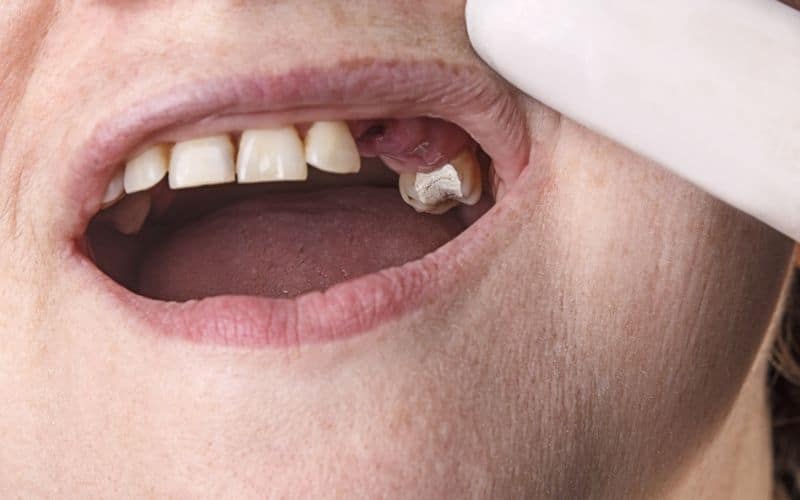A crown, also known as a dental cap or tooth cap, is a covering that goes over an unhealthy, decayed or damaged tooth. It is designed to look like a natural tooth.
In an ideal occlusion, a crown fits perfectly over the tooth that it is meant to cover. This ensures that the teeth touch properly and are functional.
Chipped Crown
A dental crown can be pretty strong but it’s not indestructible. The cement that holds it in place can break, usually due to biting down on something hard or a blow to the mouth. Sometimes the crown can also get chipped. If a crown is broken it’s important to see your dentist right away. This is especially true if it’s a bad chip or crack that exposes the tooth underneath. This can cause pain and sensitivity, especially to hot or cold foods.
Luckily, the vast majority of crowns that are chipped can be repaired by your dentist. They can usually fill in the gap with cement, though over time this can wash out and lead to decay developing on the tooth beneath.
It’s possible to prevent chips from occurring in the first place by avoiding chewing on hard objects like ice or nuts. Aside from that, crowns can also weaken over time. If this happens a dentist can usually fix it by making a new crown that’s more durable. In some cases, if the crown is too loose it might have to be replaced completely. In this case a temporary crown might be used until the permanent one is ready to be installed. Having a loose crown can affect your bite, comfort, and may even result in the need for a root canal.
Loose Crown

Crowns are meant to look and feel like a part of the tooth they’re covering. When they’re not placed properly, it can lead to issues with bite alignment, sensitivity, pain, cheek biting, crooked teeth, and other problems that require professional repair from a dentist.
Sometimes crowns chip, which is a problem that can easily be fixed with composite resin. But it’s also possible for the cement to wash out, causing a loose crown that could eventually fall off. If this happens, it’s important to call your dentist right away, because they will consider a loose crown a dental emergency and may be able to get you in the same day.
It’s possible that a crown becomes loose because the underlying tooth has changed shape over time, or because of trauma. Often, dentists can re-cement the crown if it’s undamaged and there’s no decay underneath. They will clean the tooth and crown, place new cement, and replace it.
Another reason that a crown might become loose is because of a grinding habit called bruxism. This can wear down the underlying tooth and make it less stable. If you’re a bruxer, it’s important to talk with your dentist about this habit and see what can be done to prevent your crown from becoming loose. This is especially true if you’re experiencing discomfort, sensitivity, or other problems associated with a loose crown.
Sensitive Tooth

Tooth sensitivity occurs when the hard, protective enamel layer of your teeth is worn away. When this happens, nerve endings are exposed and can feel triggered by hot or cold temperatures or by sweet and sour foods. This is usually a sign of tooth decay and should not be ignored.
Sensitivity can also be a side effect of certain medications or chronic conditions like GERD (gastroesophageal reflux disease), bulimia or gastroparesis (a condition that causes acid to leak into the esophagus and wear down your teeth). The good news is that most cases of sensitive teeth are easily treated by your dentist. They may recommend a desensitizing toothpaste or fluoride gel rinses and varnishes to gradually build up the enamel layer and decrease the sensations that are sent to the nerves.
You can also help prevent sensitivity by using a soft-bristled toothbrush, avoiding sugary or fizzy drinks and brushing gently with short strokes in the direction of your gum line. Be sure to floss regularly and slide rather than lift dental floss to avoid pulling off your temporary crown. Regular checkups will help to ensure that your crown is fitted properly and is not causing any problems with your bite, your gum health or your tooth’s longevity. If you notice any signs of damage to your crown, contact your dentist right away.
Allergies

Allergies to metal are common for patients who have undergone dental crown procedures. The metal used for dental crowns was once mostly a mixture of alloys, but many modern dentists use porcelain fused to ceramic crowns that are metal free and therefore more allergy friendly. However, some people still experience allergies to the metal used in their crowns and can develop symptoms such as itchiness or itchy gums. Other symptoms of metal allergies to dental crowns include a metallic taste in the mouth and oral ulcers near the dental crown.
Dental fillings and crowns are placed in teeth to repair a hole or decayed tooth, but these restorations can also traumatize the nerves that live in the tooth. This can cause nerve pain shortly after getting a crown and should be corrected immediately to prevent long term complications like tooth loss.
During the placement of a crown, if the dentist fumbles the procedure and places the crown too high or low on the tooth, the nerves can become traumatized and begin to hurt. This can be very painful for a patient and can result in a root canal or even tooth loss, depending on the severity of the case.
The best way to avoid this is to make sure that your dentist has experience using GC LiSi Press crowns, which are a zirconium oxide material that does not contain any metals and thus cannot trigger any allergic reactions in patients with metal allergies.


